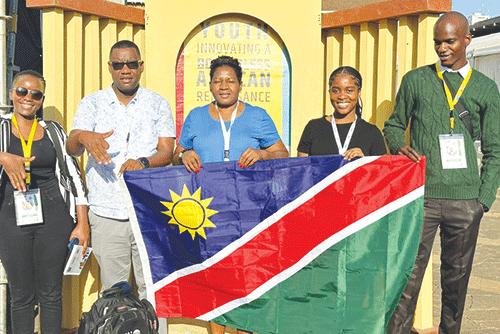Deputy youth minister Emma Kantema-Gaomas said the time is now to tap into the strength and dynamism of the youth, revolutionise agri-food systems, bolster food security and catalyse sustainable development.
Speaking at the sixth Youth Connekt Summit in Nairobi, Kenya recently, she said the theme of the summit ‘Youth Engagement in Agri-food Systems’, isn’t just a theme, it’s a clarion call to action.
“The importance of youth engagement in agri-food systems cannot be overstated. Young people, with their energy, creativity and adaptability have the potential to drive innovation and sustainability in farming,” stated the politician.
She noted that harnessing the power of the youth in agri-food systems could be the key to turning the tide on food insecurity.
“They are our future entrepreneurs, scientists, policymakers, and, importantly, our farmers. They possess the power to transform our food systems from farm to fork, making them more resilient, sustainable and equitable,” added Kantema-Gaomas.
She said the path to youth engagement in agriculture is not without obstacles, as access to land, capital and markets, coupled with the technical know-how and the impact of climate change, can be formidable barriers.
“This is where governments and policymakers must step in. As the panel members delve into interrogating this topic, I hope that you will speak to these challenges.”
Kantema-Goamas shared that in Namibia, the government has taken significant steps to empower the youth in the agri-food sector. Two key initiatives speak to this commitment: the Self-Employment Horticulture Project, and the Integrated Rural Youth Development Programme.
“The Self-Employment Horticulture Project is an initiative by our ministry, aimed at creating employment opportunities for young Namibians in different parts of the country. By encouraging young people to produce crops and vegetables, we’re not just creating jobs; we’re also contributing to our country’s food security,” she indicated.
Meanwhile, the Integrated Rural Youth Development Programme has a broader remit, as it aims to empower young people in rural areas with knowledge and skills through practical experiences and activity-based learning.
Kantema-Gaomas said: “By focusing on informal education and training, we are creating a cadre of young men and women equipped with the necessary knowledge and skills to lead economically- rewarding and satisfying lives in rural Namibia”.
She thus urged fellow policymakers on the continent to consider the youth not just as beneficiaries, but as partners, because nations need policies that not only empower the youth, but also involve them in decision-making processes.
“Let us create environments where young people can innovate, learn and grow,” she continued.
On the same occasion, Kenya’s president William Ruto stated that innovation is critical to achieving Africa’s development goals.
“To realise growth, we must deliberately focus on innovation to create fresh opportunities through the creation of new products, models and partnerships. We must also foster a conducive environment for entrepreneurship by providing young people with access to capital, mentorship, and opportunities to transform their ideas into thriving cross-border businesses,” he said passionately.
Ruto strongly believes that the youth are the undisputed agents that the continent requires for its rapid socio-economic transformation.
– psiririka@nepc.com.na


